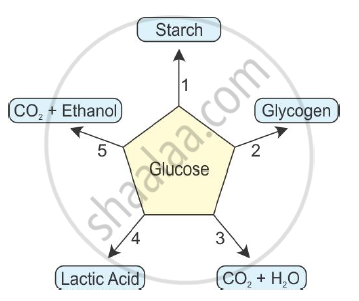Advertisements
Advertisements
Question
Given below is an example of a certain structure and its special functional activity:
"Kidney and excretion".
Fill in the blanks on a similar pattern.
Pleura and _____________.
Solution
Pleura and lung covering
APPEARS IN
RELATED QUESTIONS
State whether the statement is true or false:
Aquatic animals breathe at a slower rate than the terrestrial animals.
Given below are the end products of different reactions involving glucose.

Write the reaction number in front of the following:
(i) Anaerobic reaction =
(ii) Reaction in the human muscles =
(iii) Aerobic respiration =
(iv) Reaction in the plant cells =
(v) Reaction in the liver
The breakdown of pyruvate to give carbon dioxide, water, and energy takes place in ______.
Name one substance which is produced in anaerobic respiration by an organism but not in aerobic respiration.
What is the name of the extensions of the epidermal cells of a root which help in respiration?
Name the type of respiration in which the end product is:
C2H5OH and CO2
Give one example where such a respiration can occur.
What is meant by aquatic animals and terrestrial animals?
Draw a labelled diagram of the human respiratory system.
Which of the following is the correct sequence of air passage during inhalation?
(a) nostrils → larynx → pharynx → trachea → lungs
(b) nasal passage → trachea → pharynx → larynx → alveoli
(c) larynx → nostrils → pharynx → lungs
(d) nostrils → pharynx → larynx → trachea → alevoli
During the deficiency of oxygen in tissues of human beings, pyruvic acid is converted into lactic acid in:
The two organisms which breath only through their moist skin are:
Which of the following is most likely to have a much higher breathing rate?
Consider the following chemical reactions which take place in different organisms/tissues under various conditions:
(i) Glucose → Respiration ">Ethanol + Carbon dioxide + Energy
(ii) Glucose→ Respiration ">Carbon dioxide + Water + Energy
(iii) Glucose → Respiration "> Lactic acid + Energy
(a) Name one organism which respires according to equation (i) above.
(b) Name one organism which respires according to equation (ii) above.
(c) When and where does respiration represented by equation (iii) above take place?
(d) Which equation/equations represent aerobic respiration?
(e) Which equation/equations represent anaerobic respiration?
(f) Which of the above reactions produces the maximum amount of energy?
With which human organ system (or human systems) is alveoli associated?
Out of xylem and phloem, which one carries materials only upwards?
Differentiate between
External respiration and Internal respiration
Name the body structure concerned with the given functional activity:
Prevents food from entering the trachea during swallowing.
Name the body structure concerned with the given functional activity:
Transports oxygen to the body cells.
Given below is an example of certain structure and its special functional activity:
"Kidney and excretion".
Fill in the blanks on a similar pattern.
'C' shaped cartilage rings and ____________.
State one function of the following:
Mitochondria
Differentiate between the following pairs on the basis of the aspect given in the brackets.
Tidal volume and Residual volume (Quantity of air)
Answer the following question.
In the experimental set up to show that "CO2 is given out during respiration", name the substance taken in the small test tube kept in the conical flask. State its function and the consequence of its use.
____________ refers to a biochemical process of oxidation of organic compounds in an orderly manner for the liberation of chemical energy in the form of ATP.
Lack of oxygen in muscles often leads to cramps among cricketers. This results due to:
How does aerobic respiration differ from anaerobic respiration?
Explain the three pathways of breakdown in living organisms.
Yeast is used in wine and beer industries because it respires
